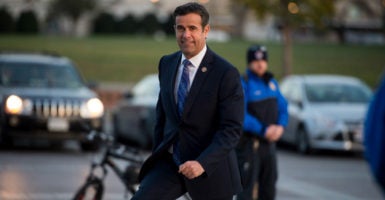He’s only a freshman, but Rep. John Ratcliffe says he already is pursuing the “most important solution to a problem” that he ever will during his time in Congress.
Ratcliffe, 50, a Texas Republican who spent a portion of his career prosecuting suspected terrorists, has chosen to make his name in Congress working on an issue where that’s hard to do: helping write legislation due for a vote in the House that would transform how the the executive branch exerts its power.
“The founding fathers set up a delicate system of checks and balances so that Congress is making laws, the executive branch is enforcing the laws, and courts are interpreting laws,” Ratcliffe told The Daily Signal in an interview. “Our system is set up on the idea that power should not accumulate in any one branch. I want to restore that balance of power. It’s why I ran for Congress.”
Ratcliffe’s action is in response to a 1984 Supreme Court decision that set the so-called Chevron doctrine, which created the precedent that courts defer to executive branch agencies in deciding how to interpret ambiguous statutes that the executive branch administers.
>>> Conservatives’ New Strategy to Curb the Executive Branch, Administrative Power
As a result of the Supreme Court’s ruling in Chevron U.S.A. Inc. v. Natural Resources Defense Council Inc., an agency such as the Department of Health and Human Services or the Environmental Protection Agency is able to implement policy as it sees fit, as long as the statute is “ambiguous” and the agency’s reading is “reasonable.”
In other words, a court won’t overturn the agency’s interpretation unless it is unreasonable, even if it is unclear.
The House was expected to vote Friday on Ratcliffe’s legislation, but Speaker Paul Ryan, R-Wis., adjourned the chamber until after July 4—two days earlier than planned—due to Democrats’ sit-in over gun control.
Ratcliffe’s legislation would seek to blunt the Chevron doctrine by clarifying the Administrative Procedures Act to say that courts, not agencies, are to interpret all questions of law, including both statutes and regulations.
“The best way I can describe it to the American people is, what if you were a litigant in court and you came in and the prosecutor in the case—the person enforcing the law—ended up being the judge in the case, the person interpreting the law,” said Ratcliffe, who is also a former mayor of Heath, Texas.
He added:
It doesn’t mean there aren’t going to be bad decisions, it doesn’t mean that it will completely do away with the administrative state and overregulation. But this is a problem we can fix and this bill can fix it.
Other Republican sponsors of the bill, dubbed the “Separation of Powers Restoration Act,” include Reps. Bob Goodlatte of Virginia and Tom Marino of Pennsylvania.
“Our system is set up on the idea that power should not accumulate in any one branch,” says @RepRatcliffe.
The Senate has its own identical version of the legislation, with big-name Republican sponsors such as Chuck Grassley of Iowa, Orrin Hatch of Utah, and Mike Lee of Utah.
Even if the legislation passes both chambers of Congress, Ratcliffe expects President Barack Obama to veto it.
The Chevron doctrine traditionally has enjoyed bipartisan support, with proponents arguing that it limits the power of activist judges and gives more authority to experts in their fields who work for administrative agencies.
“This [repealing the Chevron doctrine] will stimulate more litigation over administration agency decisions,” Alan Morrison, a professor and administrative law expert at George Washington University, told The Daily Signal in March, when Ratcliffe’s legislation was introduced.
“Agencies don’t sit down and make laws,” Morrison added. “They make decisions and rely on facts and scientific studies.”
But Ratcliffe, and others urging change, say the Chevron doctrine creates uncertainty because an agency’s interpretation of a statute can change—and alter the impact of the law—depending on the political party that controls the agency.
And despite the optics of his plan to take away power from agencies that report to the Obama administration, Ratcliffe notes that the vote on his measure is coming less than a year before a new president assumes office, and is not meant to be political.
“In fairness, I will say this [abusing the Chevron doctrine] has been a problem of both Republican and Democratic administrations going back the last couple of decades,” Ratcliffe said.
His solution “was not intended to be a partisan piece of legislation,” he said. “This isn’t about Republicans vs. Democrats. It’s about Congress standing up for itself.”
































